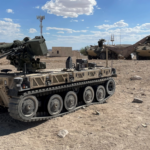Senate Armed Services Committee (SASC) Chairman Carl Levin (D-Mich.) said he is working on a plan to close tax loopholes to reduce sequestration budget cuts. Levin told members of the Reserve Officers Association at a conference in Washington that they do not have to accept the continuation of sequestration--the $500 billion in decade-long defense spending cuts that started in March. We “still have time to replace these mindless cuts with a balanced deficit-reduction package--one that protects our national security,…
Recommended

U.S. Confirms First Combat Use Of Low-Cost, One-Way Attack Drones In Iran Strikes

Trump Orders Government To Stop Using Anthropic’s AI, Hegseth Deems Firm ‘Supply Chain Risk’
Trending
Congress Updates
Wicker Wants Legislation On DoD’s Equity Investments In Minerals Supply Chain
Legislation regarding equity investments by the Defense Department in critical mineral supply chains is needed to strengthen the larger defense industrial base and demonstrate to the “free market” that the […]
“Not Sure How They Get To Where They Wanna Be,” Calvert Says of $1.5 Trillion Defense Topline Proposal
As the federal government enters a third week of tardiness in a fiscal 2027 budget release, a big question is how the Pentagon will be able to spend $500 billion […]
Path Uncertain For $1.5 Trillion FY ‘27 Defense Topline After Trump Casts Doubt On Second Reconciliation Bill
The path to achieve the White House’s call for a $1.5 trillion defense topline in 2027 appears murkier now after President Donald Trump has cast doubt on the prospects of […]
Senate Budget Dems Push For Defense Reconciliation Spending Details, Cite ‘Slush Fund’ Concerns
Democrats on the Senate Budget Committee have raised “significant concern” with the Pentagon’s move to classify reconciliation spending plans, urging the department to provide more public details on how the […]
Job Feed
-
Cleared Senior/Principal
24/7/365 Mission Operations Center Lead, Onsite - Sandia National Laboratories - Livermore, CA -
Chair, Department of Surgery
Northwell Health - Staten Island University Hospital - Staten Island, NY -
Able Seaman (AB)
M (Maintenance) MWS (part time) - Military Sealift Command - Norfolk, VA -
Ops Chief
Militray Sealift Command - , VA











